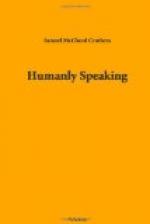“I’m afraid not,” I said, “if you insist on keeping on thinking. It is not a good place in which to rest your mind.”
II
I think Bagster is not the first person who has found intellectual difficulty here. Rome exists for the confusion of the sentimental traveler. Other cities deal tenderly with our preconceived ideas of them. There is one simple impression made upon the mind. Once out of the railway station and in a gondola, and we can dream our dream of Venice undisturbed. There is no doge at present, but if there were one we should know where to place him. The city still furnishes the proper setting for his magnificence. And London with all its vastness has, at first sight, a familiar seeming. The broad and simple outlines of English history make it easy to reconceive the past.
But Rome is disconcerting. The actual refuses to make terms with the ideal. It is a vast storehouse of historical material, but the imagination is baffled in the attempt to put the material together.
When Scott was in Rome his friend “advised him to wait to see the procession of Corpus Domini, and hear the Pope
Saying the high, high mass
All on St. Peter’s day.
He smiled and said that these things were more poetical in the description than in reality, and that it was all the better for him not to have seen it before he wrote about it.”
Sir Walter’s instinct was a true one. Rome is not favorable to historical romance. Its atmosphere is eminently realistic. The historical romancer is flying through time as the air-men fly through space. But the air-men complain that they sometimes come upon what they call “air holes.” The atmosphere seems suddenly to give way under them. In Rome the element of Time on which the imagination has been flying seems to lose its usual density. We drop through a Time-hole, and find ourselves in an inglorious anachronism.
I am not sure that Bagster has had a more difficult time than his predecessors, who have attempted to assort their historical material. For in the days before historical criticism was invented, the history of Rome was very luxuriant. “Seeing Rome” was a strenuous undertaking, if one tried to be intelligent.
There was an admirable little guide-book published in the twelfth century called “Mirabilia Urbis Romae.” One can imagine the old-time tourist with this mediaeval Baedeker in hand, issuing forth, resolved to see Rome in three days. At the end of the first day his courage would ooze away as he realized the extent of his ignorance. With a hurried look at the guide-book and a glance at the varied assortment of ruins, he would try to get his bearings. All the worthies of sacred and profane history would be passing by in swift procession.




